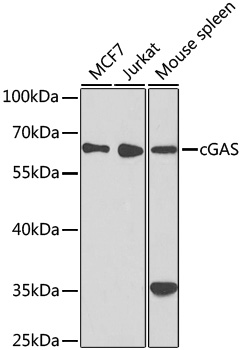Product Detail
Product NameC6orf150 Rabbit Polyclonal Antibody
Host SpeciesRabbit
ClonalityPolyclonal
IsotypeIgG
PurificationAffinity purification
ApplicationsWB
Species ReactivityHuman,Mouse
Immunogen DescA synthetic peptide of human C6orf150 (NP_612450.2).
ConjugateUnconjugated
Other NamesMB21D1;C6orf150;cGAS;h-cGAS;CGAS
Accession NoUniprot:Q8N884
GeneID:115004
Uniprot
Q8N884
Gene ID
115004
Calculated MW49kDa/58kDa
Sdspage MW59kDa
FormulationPBS with 0.02% sodium azide,50% glycerol,pH7.3.
StorageStore at -20˚C. Avoid freeze / thaw cycles.
Application Details
WB 1:500 - 1:2000
Western blot analysis of extracts of various cell lines, using cGAS antibody.
Nucleotidyltransferase that catalyzes the formation of cyclic GMP-AMP (cGAMP) from ATP and GTP and plays a key role in innate immunity (PubMed:23258413, PubMed:23707061, PubMed:23722159, PubMed:24077100, PubMed:25131990, PubMed:29976794, PubMed:30799039). Catalysis involves both the formation of a 2',5' phosphodiester linkage at the GpA step and the formation of a 3',5' phosphodiester linkage at the ApG step, producing c[G(2',5')pA(3',5')p] (PubMed:28363908, PubMed:28214358). Acts as a key cytosolic DNA sensor, the presence of double-stranded DNA (dsDNA) in the cytoplasm being a danger signal that triggers the immune responses (PubMed:28363908). Binds cytosolic DNA directly, leading to activation and synthesis of cGAMP, a second messenger that binds to and activates TMEM173/STING, thereby triggering type-I interferon production (PubMed:28363908, PubMed:28314590). Preferentially recognizes and binds curved long DNAs (PubMed:30007416). In contrast to other mammals, human CGAS displays species-specific mechanisms of DNA recognition and produces less cyclic GMP-AMP (cGAMP), allowing a more fine-tuned response to pathogens (PubMed:30007416). Has antiviral activity by sensing the presence of dsDNA from DNA viruses in the cytoplasm (PubMed:28363908). Also acts as an innate immune sensor of infection by retroviruses, such as HIV-1, by detecting the presence of reverse-transcribed DNA in the cytosol (PubMed:23929945). Detection of retroviral reverse-transcribed DNA in the cytosol may be indirect and be mediated via interaction with PQBP1, which directly binds reverse-transcribed retroviral DNA (PubMed:26046437). Also detects the presence of DNA from bacteria, such as M.tuberculosis (PubMed:26048138). cGAMP can be transferred from producing cells to neighboring cells through gap junctions, leading to promote TMEM173/STING activation and convey immune response to connecting cells (PubMed:24077100).
If you have published an article using product 53825, please notify us so that we can cite your literature.



 Yes
Yes



